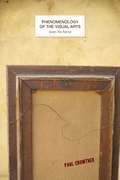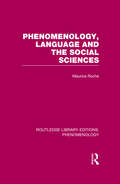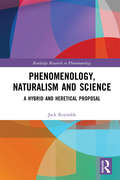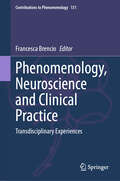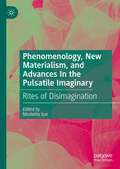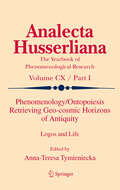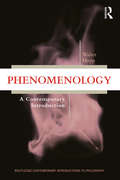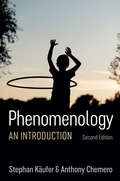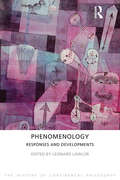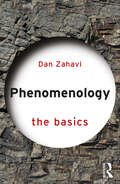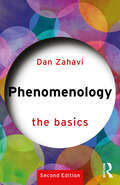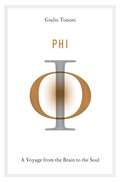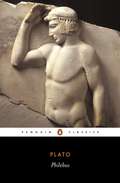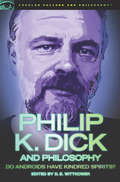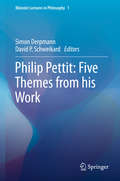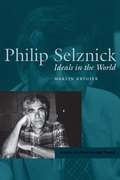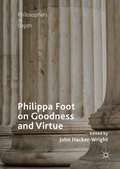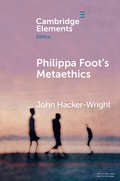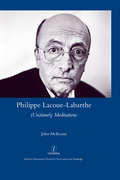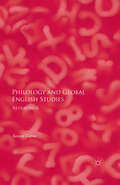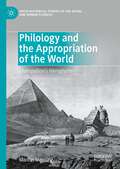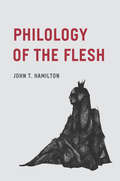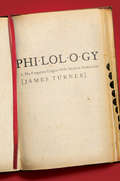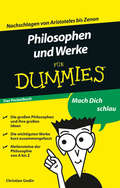- Table View
- List View
Phenomenology of the Visual Arts (even the frame)
by Paul CrowtherWhy are the visual arts so important and what is it that makes their forms significant? Countering recent interpretations of meaning that understand visual artworks on the model of literary texts, Crowther formulates a theory of the visual arts based on what their creation achieves both cognitively and aesthetically. He develops a phenomenology that emphasizes how visual art gives unique aesthetic expression to factors that are basic to perception. At the same time, he shows how various artistic media embody these factors in distinctive ways. Attentive to both the creation and reception of all major visual art forms (picturing, sculpture, architecture, and photography),Phenomenology of the Visual Artsalso addresses complex idioms, including abstract, conceptual, and digital art.
Phenomenology, Language and the Social Sciences (Routledge Library Editions: Phenomenology)
by Maurice RocheThis book looks at two ‘revolutions’ in philosophy – phenomenology and conceptual analysis which have been influential in sociology and psychology. It discusses humanistic psychiatry and sociological approaches to the specific area of mental illness, which counter the ultimately reductionist implications of Freudian psycho-analytic theory. The book, originally published in 1973, concludes by stating the broad underlying themes of the two forms of humanistic philosophy and indicating how they relate to the problems of theory and method in sociology.
Phenomenology, Naturalism and Science: A Hybrid and Heretical Proposal (Routledge Research in Phenomenology)
by Jack ReynoldsArguing for the compatibility of phenomenology and naturalism, this book also refashions each. The opening chapters begin with a methodological focus, which seeks to curb the "over-bidding" characteristic of both traditional transcendental phenomenology and scientific naturalism. Having thus opened up the possibility that the twain might meet, it is in the detailed chapters on matters where scientific and phenomenological work overlap and sometimes conflict – on time, body, and others – that the book contests some of the standard ways of understanding the relationship between phenomenological philosophy and empirical science, and between phenomenology and naturalism. Without invoking a methodological move of quarantine, in which each is allocated to their proper and separate domains, the book outlines the significance of the first-person perspective characteristic of phenomenology – both epistemically and ontologically – while according due respect to the relevant empirical sciences. The book thus renews phenomenology and argues for its ongoing relevance and importance for the future of philosophy.
Phenomenology, Neuroscience and Clinical Practice: Transdisciplinary Experiences (Contributions to Phenomenology #131)
by Francesca BrencioThis book offers fundamental insights into three main fields of education and expertise: phenomenology, neuroscience, and clinical practice. The richness and pluralism of the contributions aim to overcome the reductionist and dualistic approach to mental health and shed new light on clinical practice. Designed as both an education tool for mental health professionals, and a theoretical investigation for philosophers on the use of phenomenology in clinical practice, this book highlights the need for a new direction on mental health, and more general, on human wellbeing. This volume aims to fill the gap between philosophers and mental health professionals on an educational level, in a space unique in its open and transdisciplinary approach. It appeals to students and researchers but also very much to professionals and clinicians in the field.
Phenomenology, New Materialism, and Advances In the Pulsatile Imaginary: Rites of Disimagination
by Nicoletta IsarPhenomenology, New Materialism, and Advances In the Pulsatile Imaginary: Rites Of Disimagination brings together scholars from art history and image theory, literary studies and philosophy. Chapters of this volume engage with the overarching theme of imagination as a pulsatile force embedded in words, images, and all imaginative modes of instantiation of the work of art in their elemental aspects, expressed in visual arts, and literature, as well as bodily schemata of choreographic and musical performances. The papers employ contrasting and complementing methods from literary studies and image theory, especially phenomenology and new materialism, such as G. Bachelard and M. Merleau-Ponty, G. Bataille, J. Kristeva, P. Lacoue-Labarthe and J. Sallis, G. Didi-Huberman, H. Belting and A. Warburg, J. Bennett and Jason M. Wirth, as well as performance studies. Chapters in this volume inquire into the imaginative forces that disrupt and disinhibit the traditional habits ofimagination to create pulsatile imaginaries, i.e., a dynamic process of “emergence-resurgence” of image manifested in the act of creation and in perception. This process does not properly imply a destruction of image, but rather a withdrawal of image from the realm of representation to give way to new images and new imaginative experiences. The newly coined term “rite of disimagination” points out to this operation, consecutively implying imagining and disimaging that both denies, as well as validates image – it valorizes matter. The affirmation of the materiality of image is “the re-incarnation of image.”
Phenomenology/Ontopoiesis Retrieving Geo-cosmic Horizons of Antiquity
by Anna-Teresa TymienieckaThe controversy of flux and stasis as the groundwork of reality of Greek ancient philosophy reached its crux in the all encompassing doctrine of the logos by Heraclitus of Ephesus. It centers upon human soul in its role with the cosmos. Philosophy of the Occident corroborating Greek insights with the progress of culture in numerous interpretations (Kant, Kierkegaard, Husserl, Merleau-Ponty, Ricoeur...), presented in this collection has neglected the cosmic sphere. While contemporary development of science revealed its grounding principles (papers by Grandpierre, Kule and Trutty-Coohill) the ancient logos fully emerges. Thus, logos hitherto hidden in our commerce with earth is revealed in its intertwinings with the cosmos through the trajectories of the phenomenology/ontopoiesis of life (Tymieniecka). The crucial link between the soul and the cosmos, in a new geo-cosmic horizon, is thus being retrieved.
Phenomenology: A Contemporary Introduction (Routledge Contemporary Introductions to Philosophy)
by Walter HoppThe central task of phenomenology is to investigate the nature of consciousness and its relations to objects of various types. The present book introduces students and other readers to several foundational topics of phenomenological inquiry, and illustrates phenomenology’s contemporary relevance. The main topics include consciousness, intentionality, perception, meaning, and knowledge. The book also contains critical assessments of Edmund Husserl’s phenomenological method. It argues that knowledge is the most fundamental mode of consciousness, and that the central theses constitutive of Husserl’s "transcendental idealism" are compatible with metaphysical realism regarding the objects of thought, perception, and knowledge. Helpful tools include introductions that help the reader segue from the previous chapter to the new one, chapter conclusions, and suggested reading lists of primary and some key secondary sources. Key Features: Elucidates and engages with contemporary work in analytic epistemology and philosophy of mind Provides clear prose explanations of the necessary distinctions and arguments required for understanding the subject Places knowledge at the center of phenomenological inquiry
Phenomenology: An Introduction
by Anthony Chemero Stephan KäuferA classic in its field, this comprehensive book introduces the core history of phenomenology and assesses its relevance to contemporary psychology, philosophy of mind, and cognitive science. It provides a jargon-free explanation of central themes in the works of Husserl, Heidegger, Sartre, and Merleau-Ponty. From artificial intelligence to embodiment and enactivism, Käufer and Chemero go on to trace how phenomenology has produced a valuable framework for analyzing cognition and perception, whose impact on contemporary psychological and scientific research, and philosophical debates, continues to grow. New to this second edition are a treatment of nineteenth-century precursors of experimental psychology; a detailed exploration of Husserl's analysis of the body; and a discussion of the work of Aron Gurwitsch and other philosophers and psychologists who explored the intersection of phenomenology and Gestalt psychology. The new material also includes an expanded consideration of enactivism, and an up-to-date examination of current work in phenomenologically informed cognitive science. This is an ideal introduction to phenomenology and cognitive science for the uninitiated, and will shed new light on the topic for experienced readers, showing clearly the contemporary relevance and influence of phenomenological ideas.
Phenomenology: Responses and Developments (The History of Continental Philosophy #4)
by Leonard LawlorAfter Husserl, the study of phenomenology took off in different directions. The ambiguity inherent in phenomenology - between conscious experience and structural conditions - lent itself to a range of interpretations. Many existentialists developed phenomenology as conscious experience to analyse ethics and religion. Other phenomenologists developed notions of structural conditions to explore questions of science, mathematics, and conceptualization. "Phenomenology: Responses and Developments" covers all the major innovators in phenomenology - notably Sartre, Merleau-Ponty, and the later Heidegger - and the major schools and issues. The volume also shows how phenomenological thinking encounters a limit, a limit most apparent in the aesthetical and hermeneutical development of phenomenology. The volume closes with an examination of the furthering of the division between analytic and continental philosophy.
Phenomenology: The Basics (The Basics)
by Dan ZahaviPhenomenology: The Basics is a concise and engaging introduction to one of the dominant philosophical movements of the 20th century. This lively and lucid book provides an introduction to the essential phenomenological concepts that are crucial for understanding great thinkers such as Husserl, Heidegger, and Merleau-Ponty. Written by a leading expert in the field, Dan Zahavi examines and explains key questions such as: • What is a phenomenological analysis? • What are the methodological foundations of phenomenology? • What does phenomenology have to say about embodiment and intersubjectivity? • How is phenomenology distinguished from, and related to, other fields in philosophy? • How do ideas from classic phenomenology relate to ongoing debates in psychology and qualitative research? With a glossary of key terms and suggestions for further reading, the book considers key philosophical arguments around phenomenology, making this an ideal starting point for anyone seeking a concise and accessible introduction to the rich and complex study of phenomenology.
Phenomenology: The Basics (The Basics)
by Dan ZahaviPhenomenology: The Basics is a concise and engaging introduction to one of the important philosophical movements of the twentieth century and to a subject that continues to grow and diversify. Yet it is also a challenging subject, the elements of which can be hard to grasp.This lucid book provides an introduction to the core ideas of phenomenology and to the arguments of its principal thinkers, including Husserl, Heidegger, and Merleau-Ponty. Written by a leading expert in the field, Dan Zahavi examines and explains key questions such as: What is a phenomenological analysis? What are the methodological foundations of phenomenology? What does phenomenology have to say about intentionality, embodiment, intersubjectivity, and the lifeworld? How do ideas from classic phenomenology relate to ongoing debates in qualitative research and the cognitive sciences? This second edition has been thoroughly revised and expanded. It contains a new chapter on critical phenomenology and updated discussions of the application of phenomenology in psychiatry, psychology, and qualitative research.Including a glossary of key terms and suggestions for further reading, Phenomenology: The Basics is a superb starting point for anyone seeking a concise and accessible introduction to this rich and fascinating subject.
Phi: A Voyage from the Brain to the Soul
by Giulio TononiThis title is printed in full color throughout.From one of the most original and influential neuroscientists at work today, here is an exploration of consciousness unlike any other--as told by Galileo, who opened the way for the objectivity of science and is now intent on making subjective experience a part of science as well. Galileo's journey has three parts, each with a different guide. In the first, accompanied by a scientist who resembles Francis Crick, he learns why certain parts of the brain are important and not others, and why consciousness fades with sleep. In the second part, when his companion seems to be named Alturi (Galileo is hard of hearing; his companion's name is actually Alan Turing), he sees how the facts assembled in the first part can be unified and understood through a scientific theory--a theory that links consciousness to the notion of integrated information (also known as phi). In the third part, accompanied by a bearded man who can only be Charles Darwin, he meditates on how consciousness is an evolving, developing, ever-deepening awareness of ourselves in history and culture--that it is everything we have and everything we are. Not since Gödel, Escher, Bach has there been a book that interweaves science, art, and the imagination with such originality. This beautiful and arresting narrative will transform the way we think of ourselves and the world.
Philebus
by PlatoTaking the form of a discussion between the hedonist Philebus, his naïve disciple Protarchus and Socrates, Philebus is a compelling consideration of the popular belief that pleasure is the greatest attainable good. Here, Socrates speculates on the differing intensities of both pleasure and pain; explores the notion that they can be divided into pure and impure types; considers the relationship between the one and the many; and establishes knowledge as a far higher goal. A profound argument that true fulfillment can only be achieved by the pursuit of beauty, truth and moderation, Philebus is among the earliest and most fascinating explorations of one of the most fundamental human questions: how to lead a good life.
Philip K. Dick and Philosophy
by D. E. WittkowerScience fiction writer Philip K. Dick (1928-1982) is the giant imagination behind so much recent popular culture--both movies directly based on his writings, such as Blade Runner (based on the novel Do Androids Dream of Electric Sheep?), Total Recall, Minority Report, and The Adjustment Bureau plus cult favorites such as A Scanner Darkly, Imposter, Next, Screamers, and Paycheck and works revealing his powerful influence, such as The Matrix and Inception. With the publication in 2011 of volume 1 of Exegesis, his journal of spiritual visions and paranoic investigations, Dick is fast becoming a major influence in the world of popular spirituality and occult thinking.In Philip K. Dick and Philosophy thirty Dick fans and professional thinkers confront the fascinating and frightening ideas raised by Dick's mind-blowing fantasies. Is there an alien world behind the everyday reality we experience? If androids can pass as human, should they be given the same consideration as humans? Do psychotics have insights into a mystical reality? Would knowledge of the future free us or enslave us? This volume will also include Dick's short story "Adjustment Team," on which The Adjustment Bureau is based.Philip K. Dick and Philosophy explores the ideas of Philip K. Dick in the same way that he did: with an earnest desire to understand the truth of the world, but without falsely equating earnestness with a dry seriousness. Dick's work was replete with whimsical and absurdist presentations of the greatest challenges to reason and to humanity--paradox, futility, paranoia, and failure--and even at his darkest times he was able to keep some perspective and humor, as for example in choosing to name himself 'Horselover Fat' in VALIS at the same time as he relates his personal religious epiphanies, crises, and delusions. With the same earnest whimsy, we approach Philip K. Dick as a philosopher like ourselves--one who wrote almost entirely in thought-experiments and semi-fictional world-building, but who engaged with many of the greatest questions of philosophy throughout the Euro-American tradition.Philip K. Dick and Philosophy has much to offer for both serious fans and those who have recently learned his name, and realized that his work has been the inspiration for several well-known and thought-provoking films. Most chapters start with one or more of the movies based on Dick's writing. From here, the authors delve deeper into the issues by bringing in philosophers' perspectives and by bringing in Dick's written work. The book invites the reader with a casual familiarity with Dick to get to know his work, and invites the reader with little familiarity with philosophy to learn more. New perspectives and challenging connections and interpretations for even the most hard-core Dick fans are also offered. To maximize public interest, the book prominently addresses the most widely-known films, as well as those with the most significant fan followings: Blade Runner, Total Recall, Minority Report, A Scanner Darkly, and The Adjustment Bureau. Along with these "big five" films, a few chapters address his last novels, especially VALIS, which have a significant cult following of their own. There are also chapters which address short stories and novels which are currently planned for adaptation: Radio Free Albemuth (film completed, awaiting distribution), The Man in the High Castle (in development by Ridley Scott for BBC mini-series), and "King of the Elves" (Disney, planned for release in 2012).
Philip Pettit: Five Themes from his Work
by Simon Derpmann David P. SchweikardThis volume documents the 16th Münster Lectures in Philosophy and examines five themes that are prominent in the work of philosopher and political theorist Philip Pettit. These themes are: Epistemology and Semantics, Philosophy of Mind, Consequentialism, Group Agency, and Republicanism. The book provides insight into Pettit's work and demonstrates the central role his work plays in a number of contemporary philosophical debates. Pettit's contributions to the philosophy of mind and action, rational choice theory, the philosophy of the social sciences, as well as metaethics, normative ethics and political philosophy are main points of reference, and have advanced ongoing and initiated new discussions. The book shows that a striking feature of Pettit's work has been the depth of his analyses and arguments regarding individual topics - ranging from rule-following to free will, from group agency to social ontology and the methodology of the social sciences, from a defense of consequentialism to the revival of the republican tradition in the theory of democracy and to value theory, but also their systematic overall coherence. The book contains Pettit's lecture "Freedom and Other Robustly Demanding Goods", nine critical papers on Pettit's philosophy, and a reply article entitled "Self-Defense on Five Fronts: A Reply to My Commentators".
Philip Selznick: Ideals in the World
by Martin KrygierPhilip Selznick's wide-ranging writings engaged with fundamental questions concerning society, politics, institutions, law, and morals. Never confined by a single discipline or approach, he proved himself a major figure across a range of fields including sociology, organizations and institutions, leadership, political science, sociology of law, political theory, and social philosophy. This volume, the first book-length treatment of Selznick's ideas, discusses Selznick's various intellectual contributions. Reading across Selznick's work, one appreciates the coherence of his fundamental preoccupations-with the social conditions for frustration and the vindication of values and ideas. Exploring Selznick's insights into the nature and quality of institutional, legal, and social life, the book also examines his particular ways of thinking, concerns, values, and sensibility. Martin Krygier brings to light the coherence of Selznick's fundamental preoccupations, allowing readers to fully engage with his unique insights and distinctive moral-intellectual sensibility.
Philippa Foot on Goodness and Virtue (Philosophers in Depth)
by John Hacker-WrightThis volume focuses on controversial issues that stem from Philippa Foot’s later writings on natural goodness which are at the center of contemporary discussions of virtue ethics. The chapters address questions about how Foot relates judgments of moral goodness to human nature, how Foot understands happiness, and addresses objections to her framework from the perspective of empirical biology. The volume will be of value to any student or scholar with an interest in virtue ethics and analytic moral philosophy.
Philippa Foot's Metaethics (Elements in Ethics)
by John Hacker-WrightThis Element presents an interpretation and defence of Philippa Foot's ethical naturalism. It begins with the often neglected grammatical method that Foot derives from an interpretation of Ludwig Wittgenstein's later philosophy. This method shapes her approach to understanding goodness as well as the role that she attributes to human nature in ethical judgment. Moral virtues understood as perfections of human powers are central to Foot's account of ethical judgment. The thrust of the interpretation offered here is that Foot's metaethics takes ethical judgment to be tied to our self-understanding as a sort of rational animal. Foot's metaethics thereby offers a compelling contemporary approach that preserves some of the best insights of the Aristotelian tradition in practical philosophy.
Philippe Lacoue-Labarthe: (Un)Timely Meditations
by John McKeane"Philippe Lacoue-Labarthe (1940-2007) was a professor of philosophy, and also a poet, a translator and a playwright. His life and work were dedicated to the philosophical and political movements of the post-1968 era, from his communal life together with Jean-Luc Nancy to his collaborations with Jacques Derrida. These movements also carried him towards disparate modes of writing such as poetry and theatre. The tension between Lacoue-Labarthe's timely and untimely meditations governs the approach in this study, the first to attempt an accessible and comprehensive account of this forceful thinker."
Philology and Global English Studies: Retracings
by Suman GuptaThis book retraces the formation of modern English Studies by departing from philological scholarship along two lines: in terms of institutional histories and in terms of the separation of literary criticism and linguistics.
Philology and the Appropriation of the World: Champollion’s Hieroglyphs (Socio-Historical Studies of the Social and Human Sciences)
by Markus MesslingThis book sheds new light on the work of Jean-François Champollion by uncovering a constellation of epistemological, political, and material conditions that made his decipherment of Egyptian hieroglyphs possible. Champollion’s success in understanding hieroglyphs, first published in his Lettre à M. Dacier in 1822, is emblematic for the triumphant achievements of comparative philology during the 19th Century. In its attempt to understand humanity as part of a grand history of progress, Champollion’s conception of ancient Egypt belongs to the universalistic aspirations of European modernity. Yet precisely because of its success, his project also reveals the costs it entailed: after examining and welcoming acquisitions for the emerging Egyptian collections in Europe, Champollion travelled to the Nile Valley in 1828/29, where he was shocked by the damage that had been done to its ancient cultural sites. The letter he wrote to the Egyptian viceroy Mehmet Ali Pasha in 1829 demands that excavations in Egypt be regulated, denounces European looting, and represents perhaps the first document to make a case for the international protection of cultural goods in the name of humanity.
Philology of the Flesh
by John T. HamiltonAs the Christian doctrine of Incarnation asserts, “the Word became Flesh.” Yet, while this metaphor is grounded in Christian tradition, its varied functions far exceed any purely theological import. It speaks to the nature of God just as much as to the nature of language. In Philology of the Flesh, John T. Hamilton explores writing and reading practices that engage this notion in a range of poetic enterprises and theoretical reflections. By pressing the notion of philology as “love” (philia) for the “word” (logos), Hamilton’s readings investigate the breadth, depth, and limits of verbal styles that are irreducible to mere information. While a philologist of the body might understand words as corporeal vessels of core meaning, the philologist of the flesh, by focusing on the carnal qualities of language, resists taking words as mere containers. By examining a series of intellectual episodes—from the fifteenth-century Humanism of Lorenzo Valla to the poetry of Emily Dickinson, from Immanuel Kant and Johann Georg Hamann to Friedrich Nietzsche, Franz Kafka, and Paul Celan—Philology of the Flesh considers the far-reaching ramifications of the incarnational metaphor, insisting on the inseparability of form and content, an insistence that allows us to rethink our relation to the concrete languages in which we think and live.
Philology: The Forgotten Origins of the Modern Humanities (The William G. Bowen Series #88)
by James TurnerA prehistory of today's humanities, from ancient Greece to the early twentieth centuryMany today do not recognize the word, but "philology" was for centuries nearly synonymous with humanistic intellectual life, encompassing not only the study of Greek and Roman literature and the Bible but also all other studies of language and literature, as well as history, culture, art, and more. In short, philology was the queen of the human sciences. How did it become little more than an archaic word?In Philology, the first history of Western humanistic learning as a connected whole ever published in English, James Turner tells the fascinating, forgotten story of how the study of languages and texts led to the modern humanities and the modern university. The humanities today face a crisis of relevance, if not of meaning and purpose. Understanding their common origins—and what they still share—has never been more urgent.
Philosophen und Werke für Dummies (Für Dummies)
by Christian GodinPlaton, Hegel, Nietzsche - ihre Namen kennt jeder. Aber längst nicht jeder weiß, welcher Philosoph welche philosophischen Ideen vertreten hat. Und was steht überhaupt drin in Klassikern wie der "Kritik der reinen Vernunft" oder "Sein und Zeit"? Einfach nachschlagen! Dieses Lexikon im Taschenformat informiert Sie schnell und in verständlicher Sprache über alle großen Philosophen und Werke. Machen Sie sich auf die Reise durch den Kanon des Denkens von der Antike über das Mittelalter und die Neuzeit bis in die Gegenwart!
